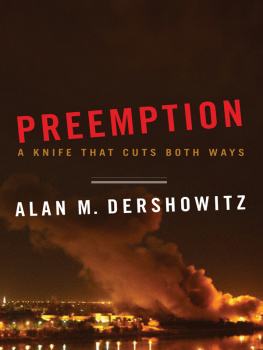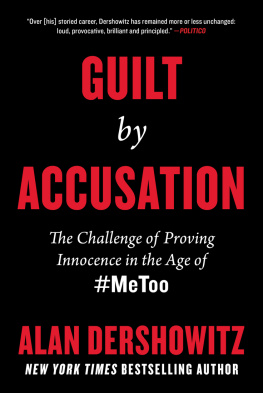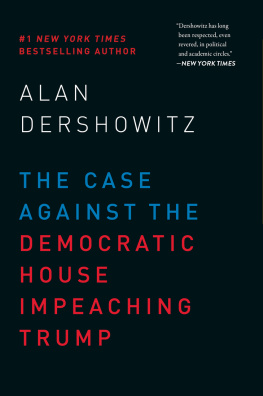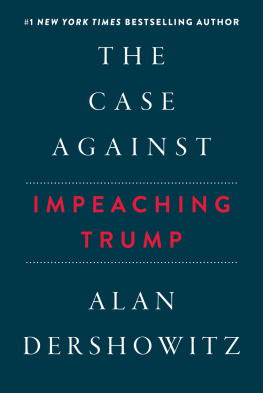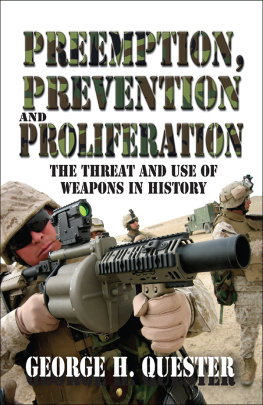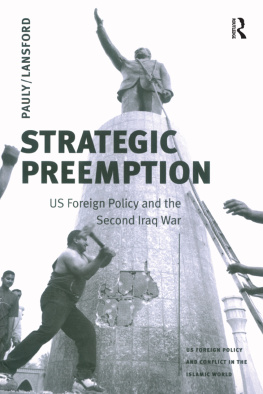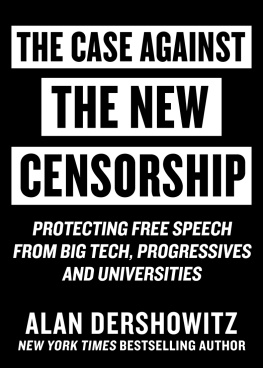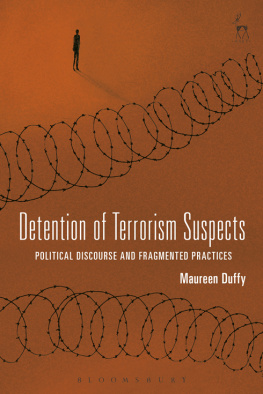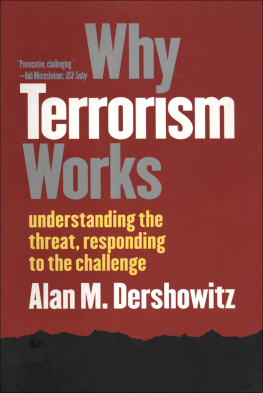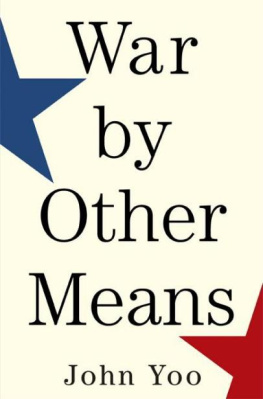
Also by Alan M. Dershowitz
The Case for Peace
Rights from Wrongs: A Secular Theory of the Origins of Rights
America on Trial
The Case for Israel
America Declares Independence
Why Terrorism Works
Shouting Fire
Letters to a Young Lawyer
Supreme Injustice
The Genesis of Justice
Just Revenge
Sexual McCarthyism
The Vanishing American Jew
Reasonable Doubts
The Abuse Excuse
The Advocates Devil
Contrary to Popular Opinion
Chutzpah
Taking Liberties
Reversal of Fortune
The Best Defense
Criminal Law: Theory and Process
(with Joseph Goldstein and Richard Schwartz)
Psychoanalysis, Psychiatry, and Law
(with Jay Katz and Joseph Goldstein)
Issues of Our Time
O urs has been called an information age, but, though information has never been more plentiful, ideas are what shape and reshape our world. Issues of Our Time is a series of books in which some of todays leading thinkers explore ideas that matter in the new millennium. The authorsbeginning with the philosopher Kwame Anthony Appiah, the lawyer and legal scholar Alan Dershowitz, and the Nobel Prizewinning economist Amartya Senhonor clarity without shying away from complexity; these books are both genuinely engaged and genuinely engaging. Each recognizes the importance not just of our values but also of the way we resolve the conflicts among those values. Law, justice, identity, morality, and freedom: concepts such as these are at once abstract and utterly close to home. Our understanding of them helps define who we are and who we hope to be; we are made by what we make of them. These are books, accordingly, that invite the reader to reexamine hand-me-down assumptions and to grapple with powerful trends. Whether you are moved to reason together with these authors, or to argue with them, they are sure to leave your views tested, if not changed. The perspectives of the authors in this series are diverse, the voices are distinctive, the issues are vital.
HENRY LOUIS GATES JR., SERIES EDITOR
W. E. B. DU BOIS PROFESSOR OF THE HUMANITIES
HARVARD UNIVERSITY | 
|
Issues of Our Time
Other titles
KWAME ANTHONY APPIAH
Cosmopolitanism: Ethics in a World of Strangers
AMARTYA SEN
Identity and Violence: The Illusion of Destiny
Forthcoming authors
WILLIAM JULIUS WILSON
LOUIS MENAND
CLAUDE STEELE
CHARLES FRIED
AMY GUTMAN
NICK LEMANN
ROLAND FRYER

Copyright 2006 by Alan M. Dershowitz
All rights reserved
First Edition
For information about permission to reproduce selections from this book, write to Permissions, W. W. Norton & Company, Inc., 500 Fifth Avenue, New York, NY 10110
Production manager: Julia Druskin
Library of Congress Cataloging-in-Publication Data
Dershowitz, Alan M.
Preemption : a knife that cuts both ways / Alan M. Dershowitz. 1st ed.
p. cm. (Issues of our time)
Includes bibliographical references and index.
ISBN 0-393-06012-8 (hardcover)
ISBN: 978-0-393-24476-2 (e-book)
1. ViolencePrevention. 2. Preemptive attack (Military science) 3. Pre-emption.
I. Title. II. Series.
HM1116.D47 2006
363.32dc22
2005027728
W. W. Norton & Company, Inc., 500 Fifth Avenue, New York, N.Y. 10110
www.wwnorton.com
W. W. Norton & Company Ltd., Castle House, 75/76 Wells Street, London W1T 3QT
This book is dedicated to my dear friend and colleague of forty years, the Honorable Irwin Cotler, Attorney General and Minister of Justice of Canada, who always carries out the biblical command to pursue justice, and who inspires me and so many others by his constant example and his unwavering commitment to principle.
CONTENTS
I wish to thank the students from my spring 2004 Preemption seminar at Harvard Law School with whom I shared insights, testing my ideas and theirs. They are: Erin Abrams, Itzhak Bam, Avigael Cymrot, Michael Fluhr, Eric Heining, Marc Jacob, Amos Jones, Shiek Pal, Anna Santeramo, Daniel Tenenblatt, Lina Tilman, Michael Tivin, Jessica Tuchinsky, Dan Urman. I also wish to acknowledge the special efforts of two people: Joel Klein, who went on to become chancellor of the New York City public school system, for his research assistance on the University of Cincinnati Law Review articles of 1974, which served as the basis for one of the chapters of this book. And Alexander Blenkinsopp, a researcher in my office who spent endless hours checking every source and giving me interesting suggestions. Other student researchers also worked at various stages on this book, including Mitch Webber, Aaron Voloj Dessauer, Danielle Sassoon, C. Wallace DeWitt, Alexander Slater, Bill Gray, Daniela Saltzman, and Taly Dvorkis. Thanks.
My assistant, Jane Wagner, my agent, Helen Rees, and my editor, Roby Harrington, all made my life easier by doing their jobs so well.
My friends and colleagues Jeffrey Epstein, Gabriella Blum, Philip Heymann, Jack Goldsmith, and Richard Goldstone provided valuable insights. My familyas usualgave me both encouragement and criticism, each in appropriate doses.
Many people in Israel, the United States, and elsewhere listened to my ideas and responded with useful information and critiques.
Finally, we all owe a debt to those on the front lines who seek to balance security and liberty, a never-ending task of great importance to all democracies.
I f reliable intelligence determined that a large-scale terrorist attack in your city were highly likely during the next few weeks, and it also pointed to a particular suspect, would you support the preventive detention of that suspect for a period of timesay, a monthuntil it could be determined whether he or she was, in fact, planning the attack?
What type and level of interrogation would you authorize to elicit the information necessary to prevent the attack?
If arrest were not feasible because the suspected terrorist was hiding in an enemy country, would you support his targeted assassination if that were the only way to stop the attack?
What if the attack could be prevented only by a military strike against a terrorist base in a foreign country?
What if a full-scale invasion were required?
If the feared attack involved a weaponized virus, such as smallpox, whose deadly impact could be substantially reduced by massive inoculation, which would, however, kill 150 to 200 of those inoculated, would you support compulsory inoculation?
If an article demonstrating how to manufacture and weaponize smallpox were about to be published, would you support the preventive censorship of that article?
These are the kinds of tragic choices that every democratic society is nowor soon will befacing. Yet we have not even begun to develop an agreed-upon jurisprudence or morality governing such drastic preventive and preemptive actions by our government. Instead, we are simply taking such actions on an ad hoc basis as we face the ongoing threats.

The democratic world is experiencing a fundamental shift in its approach to controlling harmful conduct. We are moving away from our traditional reliance on deterrent and reactive approaches and toward more preventive and proactive approaches. This shift has enormous implications for civil liberties, human rights, criminal justice, national security, foreign policy, and international lawimplications that are not being sufficiently considered. It is a conceptual shift in emphasis from a theory of deterrence to a theory of prevention, a shift that carries enormous implications for the actions a society may take to control dangerous human behavior, ranging from targeted killings of terrorists, to preemptive attacks against nuclear and other weapons of mass destruction, to preventive warfare, to proactive crime prevention techniques (stings, informers, wiretaps), to psychiatric or chemical methods of preventing sexual predation, to racial, ethnic, or other forms of profiling, to inoculation or quarantine for infectious diseases (whether transmitted naturally or by weaponization), to prior restraints on dangerous or offensive speech, to the use of torture (or other extraordinary measures) as a means of gathering intelligence deemed necessary to prevent imminent acts of terrorism.
Next page
